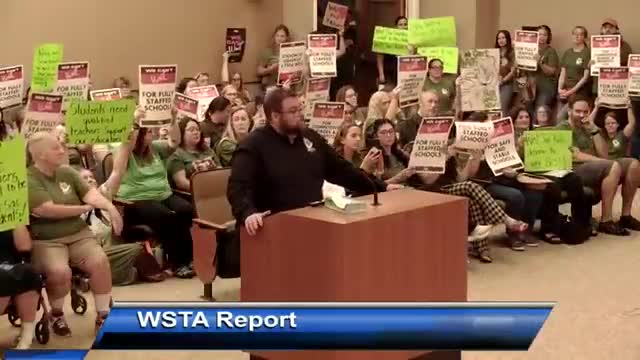Teachers, union and parents press Washington Unified board over pay, staffing and bargaining process
September 26, 2025 | West Sacramento, Yolo County, California
This article was created by AI summarizing key points discussed. AI makes mistakes, so for full details and context, please refer to the video of the full meeting. Please report any errors so we can fix them. Report an error »

Dozens of teachers, parents and students urged the Washington Unified School district board on Sept. 25 to act quickly to raise teacher pay and improve benefits, arguing low compensation is driving attrition and harming students.
The appeals came during the public-comment period at a regularly scheduled board meeting. Student leaders and dozens of district teachers, several speaking for the Washington Teachers’ (WSTA) association, warned that surrounding districts pay more and that turnover disproportionately affects higher-need schools.
“Please don’t force our teachers to leave because they can’t get the proper health care coverage and fair wages they deserve,” said Mariana Gutierrez, River City High School’s ASB president. “When we invest in our students, we invest in West Sacramento’s future.”
WSTA President (identified in public remarks as Neff) said the union has tried interest-based bargaining but that talks broke down when the district linked class-size negotiations to compensation. “When we are trying to negotiate in good faith, and you give the same offer again, we are done with interest-based bargaining,” Neff said, adding the association views the district’s 4% offer as insufficient. Neff also accused district contracting decisions and outside consultants of diverting funds that could support payroll.
Multiple teachers described classroom strain and high caseloads. Fourth-grade teacher Haley Tushar said her class currently has 34 students and estimated the district’s extra-pay policy for oversized classes effectively pays teachers “$2.50 a day” for the additional work. “I think that’s pathetic,” she said.
Other speakers described how turnover affects special education and student continuity. Parent Shannon Smith recounted a child who had multiple resource teachers year to year, saying the “constant turnover” undermined progress. Speech and language services also drew comment: Daisy Powoi warned the district relies heavily on therapy assistants and outside contractors, noting the district recently approved increases to vendor contracts while negotiation on wages remained stalled.
Several parents and teachers pointed to a $16 million district “overage” discussed at previous meetings and asked the board to reallocate district spending to prioritize classroom salaries. WSTA speakers encouraged the board to direct senior staff to identify savings in contracted services and to prioritize human capital.
The board did not take action on bargaining during the meeting; public comment sessions are not a forum for formal negotiation. Trustees acknowledged receipt of the comments and said the board would continue oversight of budget priorities and negotiations. Superintendent Hildreth thanked speakers for coming and for “making their voices heard.”
Ending: The district’s formal bargaining process continues outside the public meeting. Bargaining representatives, board members and the union indicated they would continue talks; no contract was approved at the Sept. 25 meeting.
The appeals came during the public-comment period at a regularly scheduled board meeting. Student leaders and dozens of district teachers, several speaking for the Washington Teachers’ (WSTA) association, warned that surrounding districts pay more and that turnover disproportionately affects higher-need schools.
“Please don’t force our teachers to leave because they can’t get the proper health care coverage and fair wages they deserve,” said Mariana Gutierrez, River City High School’s ASB president. “When we invest in our students, we invest in West Sacramento’s future.”
WSTA President (identified in public remarks as Neff) said the union has tried interest-based bargaining but that talks broke down when the district linked class-size negotiations to compensation. “When we are trying to negotiate in good faith, and you give the same offer again, we are done with interest-based bargaining,” Neff said, adding the association views the district’s 4% offer as insufficient. Neff also accused district contracting decisions and outside consultants of diverting funds that could support payroll.
Multiple teachers described classroom strain and high caseloads. Fourth-grade teacher Haley Tushar said her class currently has 34 students and estimated the district’s extra-pay policy for oversized classes effectively pays teachers “$2.50 a day” for the additional work. “I think that’s pathetic,” she said.
Other speakers described how turnover affects special education and student continuity. Parent Shannon Smith recounted a child who had multiple resource teachers year to year, saying the “constant turnover” undermined progress. Speech and language services also drew comment: Daisy Powoi warned the district relies heavily on therapy assistants and outside contractors, noting the district recently approved increases to vendor contracts while negotiation on wages remained stalled.
Several parents and teachers pointed to a $16 million district “overage” discussed at previous meetings and asked the board to reallocate district spending to prioritize classroom salaries. WSTA speakers encouraged the board to direct senior staff to identify savings in contracted services and to prioritize human capital.
The board did not take action on bargaining during the meeting; public comment sessions are not a forum for formal negotiation. Trustees acknowledged receipt of the comments and said the board would continue oversight of budget priorities and negotiations. Superintendent Hildreth thanked speakers for coming and for “making their voices heard.”
Ending: The district’s formal bargaining process continues outside the public meeting. Bargaining representatives, board members and the union indicated they would continue talks; no contract was approved at the Sept. 25 meeting.
View full meeting
This article is based on a recent meeting—watch the full video and explore the complete transcript for deeper insights into the discussion.
View full meeting
